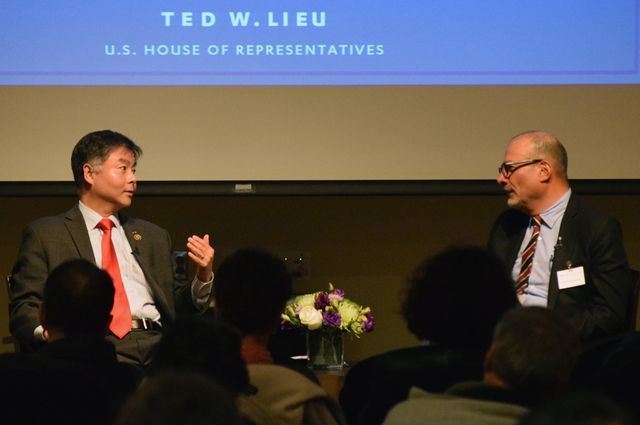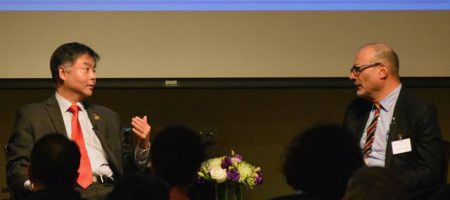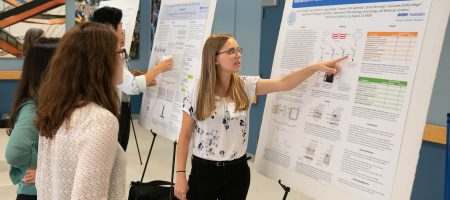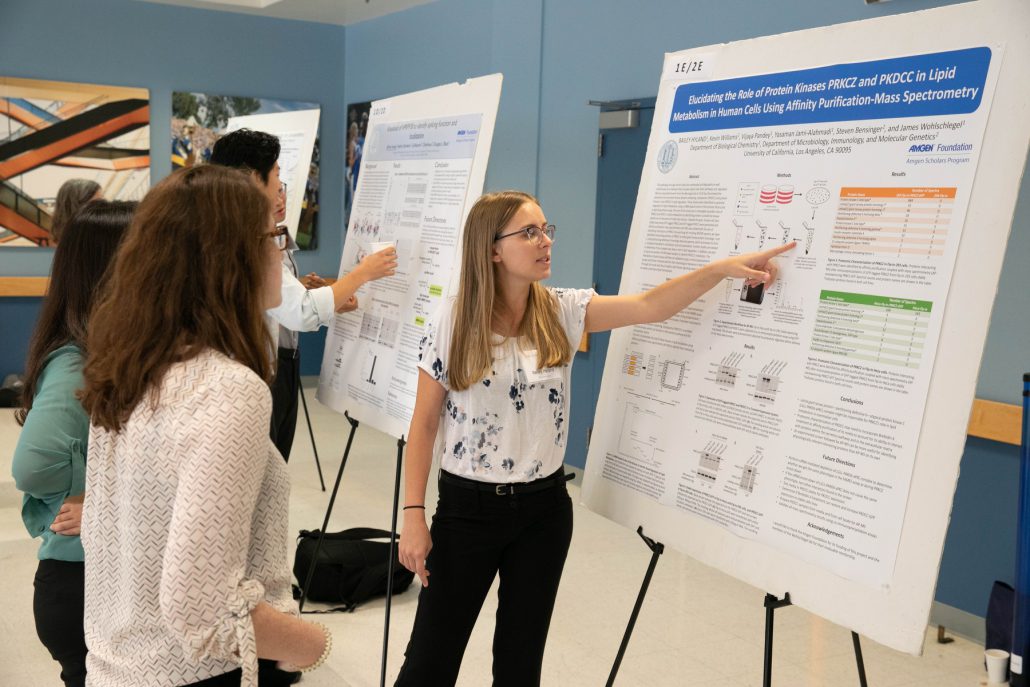U.S. Rep. Ted Lieu says government can help make society more just for all

U.S. Rep. Ted Lieu speaks with UCLA professor Abel Valenzuela during an audience Q&A following the Winston C. Doby lecture.
U.S. Rep. Ted Lieu came from Taiwan to the United States with his family when he was 3 years old. And since then, he has tried to champion the ideals that propelled him and his family to success.
“In my mind, [my parents] achieved the American dream,” the California Democrat told the crowd as he delivered the UCLA Academic Advancement Project’s Winston C. Doby Distinguished Lecture. “They went from being poor, to owning a home, to giving my brother and I an amazing education.”
Lieu told his story to a rapt audience of students, faculty and alumni on Feb. 19 at the California NanoSystems Institute. This year was the seventh Doby lecture, which is put on by UCLA’s Academic Advancement Program.
Known as AAP, the Academic Advancement Program is the nation’s largest university-based student diversity program, with a tradition of more than 40 years at UCLA. It has reached more than 5,600 students through academic advising, collaborative learning workshops, mentoring, scholarships and a summer bridge program for entering freshmen and transfer students.
AAP established the Doby lecture to honor its creator and first director, Winston C. Doby, who devoted more than 40 years advocating for access and social justice in higher education for all students.
“He continues to be an inspiration to me,” said Charles Alexander, associate vice provost for student diversity and current AAP director. “He was very involved in many, many incredible things in terms of building this campus and building campus community.”
As Lieu considered the topic of how to make society more just and fair for everyone, he broke it down into three distinct areas for his approximately 45-minute lecture: education, immigration and criminal justice reform.
“The single best investment our nation can make is in education,” said Lieu, who added that he found inspiration in Doby’s work and the work of UCLA’s Academic Advancement Project. “We have to think about it, not just for higher education, but all the way down.”
Lieu emphasized the benefits of investing in education for children ages 0-5, and to also look for holistic solutions. He emphasized the need to lift families out of poverty as the best way to improve educational outcomes
“That would do more to improve public education than anything we could do,” Lieu said.
He cited an example of a Los Angeles nonprofit that went into schools and tested children’s eyesight. As many as 30 percent of students in several schools needed eyeglasses, which the nonprofit delivered. Once the students were able to see clearly, test scores improved. “If you could take into account these non-school factors, that is a big way to improve public education.”
On immigration, Lieu expressed his frustration that a deal to protect people who qualified for the Deferred Action for Childhood Arrivals program fell through, but vowed to continue to find a way to halt any unfair immigration laws that President Donald Trump’s administration might propose. Lieu said that he would still consider giving in to some of the administration’s demands — perhaps even a wall — if there was comprehensive immigration reform, including a pathway to citizenship for undocumented immigrants, he and many others seek. Lieu said he did not want to rule that out.
Even though it can often be difficult to find political common ground in Washington, D.C., Lieu co-authored a recently passed criminal justice reform bill. The bill has lowered sentences for non-violent crimes, among other actions.
“It was not huge, but it was a step in the right direction,” Lieu said, adding that a good second step would be to implement bail reform. “If you really look into it, it is a disaster. On any given day, hundreds of thousands of people are locked up in prisons and jails, not because they’ve been convicted of anything, but because they are too poor to pay the fee to get out of jail or prison.”
Under current bail laws people get released because they can afford to pay a large bail, not because they committed a crime that makes them less of a threat to the community. Consequently, poorer people languish in jail.
Lieu said a newer risk analysis system that adjusts to that reality has been previously implemented in Washington, D.C. and Kentucky — and this year in California — has shown early positive results.
Lieu briefly discussed Trump’s declaration of a national emergency at the border between the United States and Mexico.
“Study after study after study say that both documented and undocumented immigrants commit less crime than people born here,” Lieu said, adding that he thinks there is a good argument to be made in the courts to halt the national emergency declaration.
Lieu concluded by taking the time to talk about the humanitarian crisis caused by the Yemen Civil War. He said his heart goes out to the Yemen civilians who are suffering, and he’s distressed by the mounting casualties from Saudi Arabian airstrikes — something he has fought to bring to the national consciousness. “War crimes are not a partisan issue.”
After his speech, Lieu fielded questions from the audience, assisted by moderator Abel Valenzuela, UCLA professor of urban planning and Chicana and Chicano studies, as well as UCLA Chancellor Gene Block’s adviser on immigration. Topics included the 2020 presidential election, Green New Deal and affirmative action.
Lieu concluded by emphasizing the social justice aspect of the evening, and vowing to continue to fight for those ideals in Congress. “I’m in politics to make sure this [American] dream remains possible for people who want to work hard and succeed.”




